
Latest News Regarding
Horn of Africa
Somali leaders converge for electoral talks as international community demands way forward
Somali leaders converge for electoral talks as international community demands way forward




Source: Hiraan Online, Saturday April 3, 2021
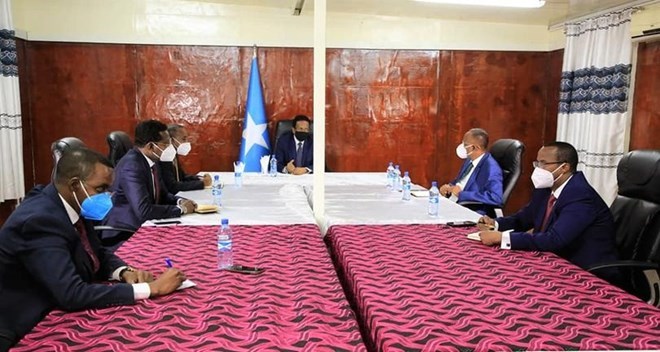
MOGADISHU (HOL) – The much awaited meeting between President Mohamed Farmaajo and Federal Member State leaders has kicked off in Mogadishu this morning raising expectations of an electoral deal.
The leaders arrived at the air force hangar in Afiysoni area about 10am after several weeks of push and pull.
Information Minister Osman Dubbe called the meeting an ‘icebreaker’ convened by Farmaajo.
The international community has however pilled pressure on the leaders as the ongoing gridlock plunges the country into uncertainty.
The meeting was expected to start early last month under the auspices of the international community but failed to owing to thelack of agreement on the agenda of the meeting.
The UN Security Council this week called for ‘urgent’ elections as western envoys and the African Union heightened pressure on the federal and state leaders.
It was not immediately clear if the two sides-Farmaajo faction and the Jubbaland-Puntland camp had settled the contentious issues which included the inclusion of the opposition, legitimacy of the presidency and parliament owing to term lapse among others.
The debate and endorsement of the Baidoa Framework which provides an implementation plan for the September Agreement is expected to feature prominently during the meeting.
Both Jubbaland and Puntland have demanded the September deal be relooked by the international community and federal government have stood ground against further debate on the deal.
Regulating Conventional Arms in Middle East and Horn of Africa
Regulating Conventional Arms in Middle East and Horn of Africa
Source: Manara Magazine published on 16 March 2021 an article titled “Opportunities to Regulate Conventional Arms in the Middle East and Horn of Africa” by Rachel Stohl and Ryan Fletcher.
The article considers the opportunities and challenges that exist to better regulate the flow of conventional weapons in the Middle East and the Horn of Africa. It examines the international mechanisms and regulatory architecture that exist to regulate the conventional arms trade, considers the extent to which these can be applied to regulate weapons flows, and offers recommendations for increasing participation and supporting implementation of these instruments to combat the unregulated trade in conventional arms.0 commentsLabels: arms sales, Arms Trade Treaty, Biden administration, Egypt, Horn of Africa, Middle East, SALW, Saudi Arabia, UAE, UN Register of Conventional Arms, Yemen
Ethiopia Needs a Constitutional Convention
Ethiopia Needs a Constitutional Convention
Source: Source: Foreign Policy posted on 1 April 2021 a commentary titled “Ethiopia Needs a Constitutional Convention” by Adem K. Abebe, International Institute for Democracy and Electoral Assistance in the Netherlands.
The author argues that Ethiopia is in crisis and the way out of its many problems is a constitutional convention and process-oriented national dialogue.0 commentsLabels: Abiy Ahmed, Benishangul-Gumuz Region, constitution, COVID-19, EPRDF, Ethiopia, ethnic federalism, GERD, governance, Oromia, Prosperity Party, Sudan, Tigray Region, TPLF
Africa and the 2021 World Happiness Report
Africa and the 2021 World Happiness Report
Source: The World Happiness Report 2021 has just been released, which includes a ranking of happiness covering the years 2018-2020. The focus of the report is a measurement of subjective well-being, which relies on three main indicators: life evaluations, positive emotions, and negative emotions.
The report gives the highest ranking to Finland. The United States ranks in position number 19. The highest scoring African country is Mauritius in position 50, followed by Libya at 80, and Republic of Congo at 83. Seven of the ten lowest ranked countries are in Africa: Burundi (140), Tanzania (142), Malawi (144), Lesotho (145), Botswana (146), Rwanda (147), and Zimbabwe (148).0 commentsLabels: COVID-19, Libya, Mauritius, Republic of Congo, subjective well being, World Happiness Report
Ethiopia’s War in Tigray: A Deadly Military Stalemate
Ethiopia’s War in Tigray: A Deadly Military Stalemate
Source: The International Crisis Group (ICG) published on 2 April 2021 an analysis titled “Ethiopia’s Tigray War: A Deadly, Dangerous Stalemate.”
The ICG report predicts a protracted conflict in Tigray Region. All sides are fixated on securing a military victory, which seems unlikely. Urgent measures are needed to prevent a tragedy. 0 commentsLabels: Abiy Ahmed, Amhara militia, atrocities, ENDF, Eritrea, Eritrean Defense Forces, Ethiopia, humanitarian crisis, Isaias Afewerki, Tigray Defense Forces, Tigray Region, TPLF, Tsadkan Gebre Tensae
In stark warning, Egypt leader says Nile water ‘untouchable
In stark warning, Egypt leader says Nile water ‘untouchable




Source: AP, , Wednesday March 31, 2021
Egyptian President Abdel Fattah al-Sisi holds a news conference with the Chairman of the Sovereignty Council of Sudan Gen. Abdel Fattah Abdelrahman al-Burhan at the Presidential Palace in Khartoum, Sudan, Saturday, March. 6, 2021. Egypt’s presidency says President Abdel Fattah el-Sissi trip was to address an array of issues, including economic and military ties and the two nations’ dispute with Ethiopia over a massive dam Addis Ababa is building on the Blue Nile. The visit comes amid a rapprochement between the two governments. (Presidency of Sudan via AP)
ISMAILIA, Egypt (AP) — Egypt’s president said Tuesday his country’s share of the Nile River’s waters are “untouchable” in a stark warning apparently to Ethiopia, which is building a giant dam on the Nile’s main tributary.
The comment from President Abdel Fattah el-Sissi comes amid a deadlock in the yearslong talks over the dam between the Nile Basin countries, which also includes Sudan.
In a news conference, el-Sissi warned of “instability that no one can imagine” in the region if the Grand Ethiopian Renaissance Dam is filled and operated without a legally binding agreement.No one can take a single drop of water from Egypt, and whoever wants to try it, let him try,” he said. “No one imagines that it will be far from our capabilities.”
El-Sissi did not name Ethiopia in his remarks, the strongest on the dam’s dispute by an Egyptian official in years.
A media officer at the the Ethiopian Embassy in Cairo declined to comment on el-Sissi’s remarks.
The Egyptian leader was firm while discussing the dam dispute at a news conference in the Suez Canal city of Ismailia. He visited the crucial, east-west waterway following its reopening Monday. It had been closed for six days after a hulking container ship became stuck in the waterway.
“I repeat that the waters of Egypt are untouchable, and touching them is a red line,” he said.
However, el-Sissi said his country prioritizes negotiations to resolve the lingering dispute before Ethiopia continues filling the dam’s giant reservoir during this year’s rainy season. Addis Ababa began filling the reservoir last July, a move that was strongly criticized by Egypt and Sudan.
“Our battle is a battle of negotiations,” the Egyptian leader said, adding that Cairo seeks a legally binding agreement based on international laws and norms that govern cross-border rivers.
“We are serious about achieving a win-win (deal) for everyone, no one is going to get everything alone,” he said.
El-Sissi said a new round of negotiations is expected in the coming weeks. He did not elaborate further on whether international players would join the talks as mediators as Khartoum and Cairo have demanded.
Ethiopia has rejected an Egyptian-backed Sudanese proposal to internationalize the dispute by including the U.S., U.N. and European Union as mediators in talks that have been mediated by the African Union.
The dispute centers on the speed at which a planned reservoir is filled behind the dam, the method of its annual replenishment, and how much water Ethiopia will release downstream if a multi-year drought occurs. Another point of difference is how the three countries would settle any future disputes.
Egypt and Sudan call for a legally binding agreement on the dam’s filling and operation, while Ethiopia insists on guidelines.
Egypt is a mostly desert country that depends on the Nile for almost all of its water needs. It fears that a quick fill would drastically reduce the Nile’s flow, with potentially severe effects on its agriculture and other sectors.
Ethiopia says the $5 billion dam is essential, arguing the vast majority of its population lacks electricity. The dam will generate over 6,400 megawatts of electricity, a massive boost to the country’s current production of 4,000 megawatts.
Sudan wants Ethiopia to coordinate and share data on the dam’s operation to avoid flooding and protect its own power-generating dams on the Blue Nile, the main tributary of the Nile River. The Blue Nile meets with the White Nile in central Sudan. From there the Nile winds northward through Egypt and flows into the Mediterranean Sea.
Kenyan pilot escape to Somalia sparks fears of air attack
Kenyan pilot escape to Somalia sparks fears of air attack




Source: theSTAR, Thursday April 1, 2021
By CYRUS OMBATI
Police urge the public to give information if he is seen anywhere

Kenyan security agents are on alert over a missing pilot who escaped to Somalia.
There are fears Rashid Mwalimu, who is a trained pilot, may sneak back to Kenya on a mission and police want the public to help them in arresting him.
“He is wanted by the Anti-Terrorism Police. He is a trained pilot on mission to carry out aviation attack. Currently, he is in Somalia and is planning on how to sneak back into Kenya. If seen, report to any nearest security agency,” police said in an This follows a series of events that have seen al Shabaab suffer major setbacks in Somalia following persistent airstrikes which have killed commanders and middle-level operatives in good measure.
According to the police, as a way of revenging the airstrikes, al Shabaab embarked on training pilots for an international aviation attack.
They identified amongst their ranks foreign fighters that had some good level of education for specialised training. Amongst them, two were selected for training as pilots, including Cholo Abdi Abdulla and Mwalimu.
Security sources indicate that Abdulla and Mwalimu were close friends and joined al Shabaab in 2015 where they trained and conducted attacks in Somalia before being sent to Boni forest.
Their educational background turned out to be higher than the other operatives and therefore were selected by the terror group for the aviation course.
A security source has revealed that between 2015 and 2016 both Mwalimu and Abdulla were involved in IED attacks in Boni area of Lamu county.
The two were also close associates of the leader of the dusitD2 attack, Salim Gichunge, aka Faruq.
Mwalimu, Abdulla and Gichunge arrived in Somalia at the same time and were immediately set aside for training as part of the al Shabaab intelligence, the Amniyat.
While on training, they met up with Osman Gedi another dusitD2 attacker. The four formed a close bond and were always together.
When the airstrikes began in earnest, al Shabaab picked on the four for external attack. Gichunge and GedI were selected for an attack in Kenya, while Mwalimu and Abdulla were picked to train as pilots and subsequently be deployed to hijack aircrafts.
Abdulla was subsequently arrested on July 1, 2019 in the Philippines where he had been studying aviation at All-Aisa aviation Academy in Philippines.
According to US authorities on December 16, 2020, Abdulla is facing six counts of terrorism-related offences arising from his activities as an al Shabaab member, including conspiring to hijack an aircraft to conduct a 9/11 style of attack in the US.
He was arrested in Philippines and was subsequently transferred to the custody of US law enforcement for prosecution.
As part of the dissembling efforts and attempts to fit in, and contrary to any claim al Shabaab has on religious piety, Mwalimu and Abdulla lived luxurious lifestyles partaking of alcohol and living promiscuously while on training.
This behaviour was actually sanctioned by top al Shabaab echelons who advise its trainees to live liberally and ensure they fit in.
For instance, Abdulla had a girlfriend from one of the Asian countries who was his classmate, even after she left college, he maintained a long distance relationship. Mwalimu, for his part, lived to his true self as a womaniser, dating several women at a go and lavishing them with money obtained forcibly by al Shabaab from poor populations in Somalia.
They were allowed unlimited access to money, and would fly to various destinations as tourists on first class rates, partly as a way of checking the security arrangement around the cockpit.
Mwalimu and Abdulla have acquired a level of expertise where they can navigate a plane while airborne and as such should never be allowed on board an aircraft.
Indeed, according to security officials they had already completed their training and were conversant with flying and landing planes and all mechanical application in a plane though they had not acquired international licences.
However, for a successful attack, all they needed to do was board a plane as ordinary passengers and thus licences would not be a hindrance to an attack.
Their reckless behaviour is what led the security agents to their trail as they dropped their guard and let out their little and big secrets.
Mwalimu revealed operational information, which in turn blew up his and Abdulla’s cover.
Unfortunately, while Abdulla was arrested, Mwalimu managed to escape back to Somalia after learning of the arrest and cunningly lied about what could have led to security agents bursting their plot.
Police have released a photo of Mwalimu and have urged the public to be vigilant and give information if he is sighted anywhere.
The security agents recognise the cooperation that the public have extended in the war against terrorism, which has led to disruption of many plots and urges the public to continue with this partnership.
-Edited by Sarah Kanyara
Biden extends US economic sanctions over security situation in Somalia – White House
Biden extends US economic sanctions over security situation in Somalia – White House




Source: Friday April 2, 2021
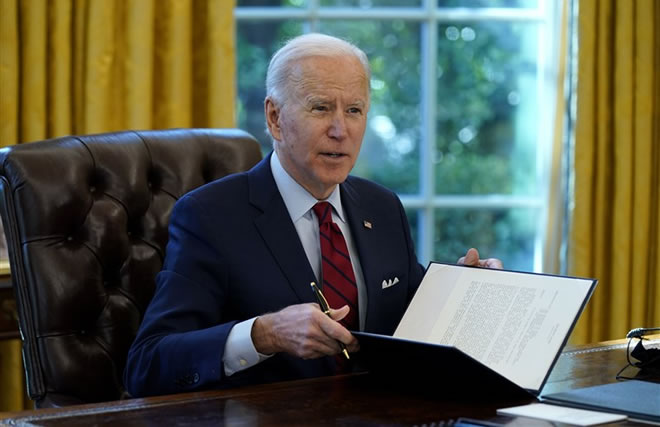
Washington (Sputnik) – President Joe Biden has signed an order extending for at least another year US economic sanctions imposed on Somalia that were previously approved by presidents Barack Obama and Donald Trump, the White House announced in a press release.“The situation with respect to Somalia continues to pose an unusual and extraordinary threat to the national security and foreign policy of the United States,” the president said on Thursday. “For this reason, the national emergency declared on April 12, 2010, and the measures adopted on that date and on July 20, 2012 … must continue in effect beyond April 12, 2021.”
Biden said he was accordingly keeping the previous Executive Order 13556 in place for the next 12 months.
In the latest example of ongoing terrorist violence in the East African country, at least five civilians were killed as a result of a car bomb attack targeting an official in the Somalian capital of Mogadishu, media outlets said on Monday.
Somali regional state leader calls on FMS leaders to protect borders.
Somali regional state leader calls on FMS leaders to protect borders.




Source: hiiraan online, Friday April 2, 2021
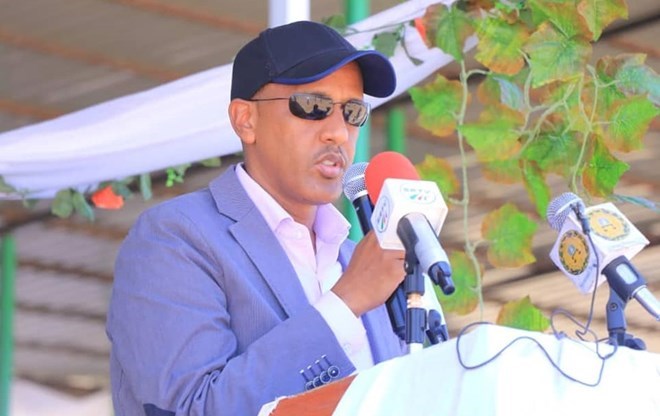
Mogadishu (HOL) – The President of Somali Regional State, Mustafe Cagjar, has called on the leaders of Galmudug and Hirshabelle administrations to protect their shared borders.
President Cagjar also called on Galmudug and Hirshabelle to respect their recent agreements.”I urge the Hirshabelle and Galmudug administrations to respect the agreements reached and work together for the security of their borders,” said Cagjar.
President Mustafe Cagjar also warned that the remnants of Al-Shabaab and TPLF should return to the areas under their control. Somali regional government and its borders with Hirshabelle and Galmudug.
President Cagjar’s statement comes after peace agreements were signed between Hirshabelle, Galmudug and his administration last month. However, the agreement between Hirshabelle and the local government was vehemently opposed by some intellectuals in the Hiiraan region. They described the agreement as two individuals who are not in the interest of the people of Hiiraan.
Egypt Ramps Up Pressure on Ethiopia
Egypt Ramps Up Pressure on Ethiopia
Source: The Middle East Eye published on 19 March 2021 a commentary titled “Will Egypt Go to War with Ethiopia over the Grand Renaissance Dam?” by Mustafa Salama.
Egypt and Sudan have agreed, contrary to the wishes of Ethiopia, to pursue a mediation of issues surrounding the Grand Ethiopian Renaissance Dam by the AU, EU, US, and UN. Egypt has also aligned its position closely with Sudan’s increasingly hostile approach towards Ethiopia. While the author is not predicting war between Egypt and Ethiopia, he suggests it could be a tactic to rally Egyptian domestic support. 0 commentsLabels: Abdel Fattah al-Sisi, Egypt, Ethiopia, GERD, Libya, mediation, Nile waters, Qatar, Sudan, Tigray Region, Turkey
EU slaps sanctions on Eritrea over human rights abuses
EU slaps sanctions on Eritrea over human rights abuses




Source: Reuters, Monday March 22, 2021
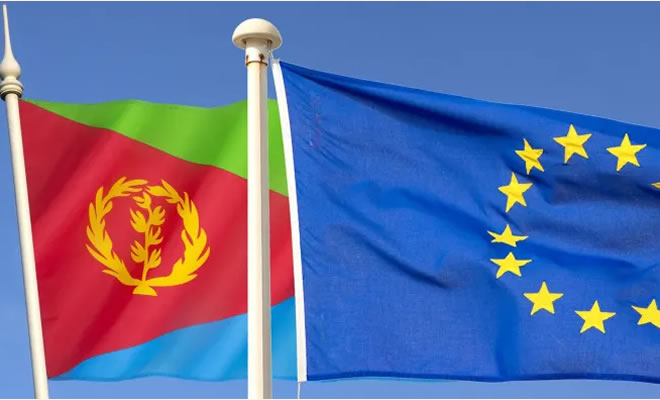
The European Union on Monday imposed sanctions on Eritrea over human rights violations and blacklisted the country’s National Security Office which is tasked with intelligence gathering, arrests and interrogations.
At the beginning of March, the United Nations said Eritrean troops were operating throughout Ethiopia’s northern Tigray region and reports suggested they were responsible for atrocities.
“The National Security Office is responsible for serious human rights violations in Eritrea, in particular arbitrary arrests, extrajudicial killings, enforced disappearances of persons and torture,” the EU said after foreign ministers of the 27-nation bloc agreed the measures.The sanctions mean an asset freeze in the EU. Additionally, individuals and entities in the EU are prohibited from making funds available, either directly or indirectly, to those listed.
Ethiopia and Eritrea have denied the involvement of Eritrean troops in the fighting alongside Ethiopian forces, although dozens of witnesses, diplomats and an Ethiopian general have reported their presence.
Thousands of people have died amid the fighting, hundreds of thousands have been forced from their homes and there are shortages of food, water and medicine in Tigray, a region of more than 5 million people.
The EU is considering imposing further sanctions on Eritrea. (Reporting by Sabine Siebold; Editing by Bernadette Baum)
Egypt, Somalia FMs discuss cooperation
Egypt, Somalia FMs discuss cooperation




Source: Xinhua net, , Tuesday March 23, 2021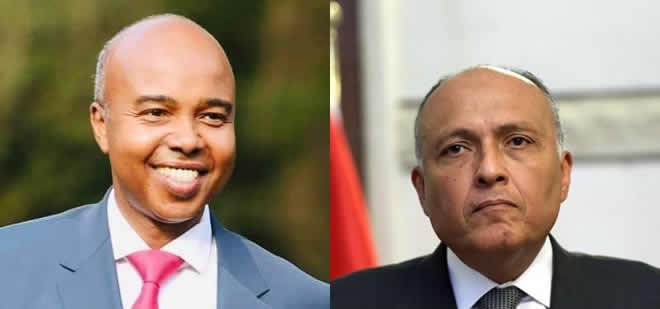
Somalia’s Minister of Foreign Affairs and International Cooperation Mohamed Abdirizak (L) and Egyptian Foreign Minister Sameh Shoukry (FILE PHOTOS)
Egyptian Foreign Minister Sameh Shoukry and Somalia’s Minister of Foreign Affairs and International Cooperation Mohamed Abdirizak discussed here on Monday means of promoting bilateral cooperation in all fields, the Egyptian foreign ministry said in a statement.The talks tackled the exerted efforts for developing the cooperation between the two sides in a way that reflects the strong mutual relations,” said Ahmed Hafez, spokesperson of the Egyptian foreign ministry.
“Egypt pays full attention to achieving peace and stability in Somalia, and called on all the Somali sides to continue the dialogue for paving the r
Climate change deprives 70% of Somalis of safe water
Climate change deprives 70% of Somalis of safe water’



Source: Anadolu Agency, Tuesday March 23, 2021
Without immediate humanitarian aid, crisis is likely to peak in June, says Save the Children
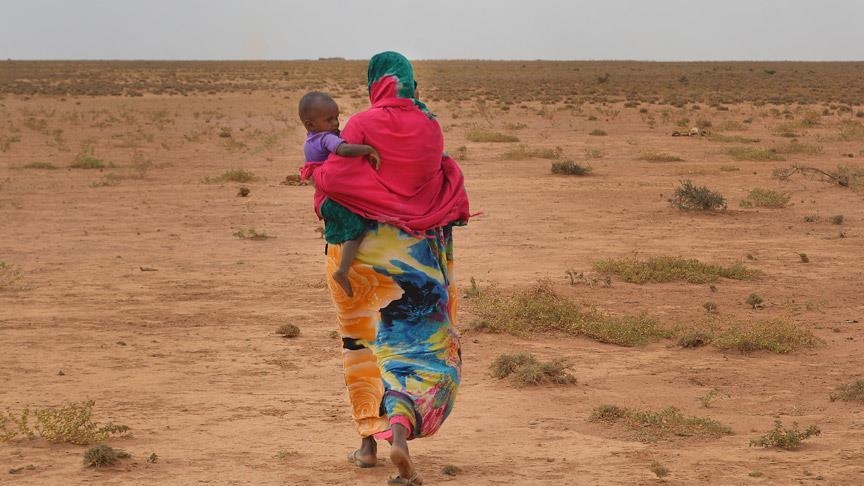
ANKARA —Climate change-caused drought in Somalia has left 70% of families in the country without access to safe drinking water and in urgent need of humanitarian support, according to the non-profit organization Save the Children.
“Thousands of children are now reliant on emergency water trucking and unprotected wells or are forced to leave their homes in search of water,” it said in its latest report. rainfall and severe water shortages are also killing livestock, causing crop failures and diminishing household incomes, leaving children in these families with fewer daily meals and less nutritious food, the report warned.
The loss of livestock also further exposes children in Somalia to the risk of malnutrition as they have less access to milk, Save the Children said.
“As the negative impacts of climate change intensify, the frequency and severity of extreme weather events in Somalia are increasing. In the past year alone, Somalia experienced severe floods, the most powerful cyclone to ever hit the country and now a looming drought. Communities are struggling to survive as they have no time to recover before the next crisis hits,” it said.
The report stressed that without immediate humanitarian aid, the crisis in Somalia is likely to peak in June, with the number of children and adults in urgent need of humanitarian support soaring to 5.9 million.
“The international community has been very generous in supporting people in Somalia. However, to reduce support now would be disastrous, as the deadly combination of continuous climate shocks, COVID-19 and conflict are pushing children and their families to the limit and they need urgent support to help them survive,” it warned.
Sudan Requests Four-party Mediation of Grand Ethiopian Renaissance Dam
Sudan Requests Four-party Mediation of Grand Ethiopian Renaissance Dam
Source: Aljazeera published on 15 March 2021 an article titled “Sudan Formally Requests Four-Party Mediation in GERD Row.”
Sudan’s Prime Minister Abdalla Hamdok has formally requested that the UN, EU, and US join the AU in mediation of the dispute over the Grand Ethiopian Renaissance Dam (GERD) on the Blue Nile near the Sudanese border. Sudan says it fears the GERD will increase the risk of flooding in Sudan and will affect the operation of its dams on the Blue Nile–Roseires and Sennar–and possibly the Meroe further downstream on the main Nile.
Sudanese concerns about the GERD’s impact on flooding are somewhat perplexing in that the GERD has the potential to regulate frequent flooding in Sudan caused by the Blue Nile during the heavy rains. When there was no GERD, as was the case for thousands of years, Sudan was periodically impacted by flooding of the Blue Nile with no ability in Ethiopia to help control it. While there certainly needs to be an understanding between Sudan and Ethiopia on release of water from the GERD during strong rainy periods, the GERD should be seen as a positive development for controlling flooding in Sudan. The Carnegie Middle East Center published in February 2021 a useful analysis titled “The Dam that Broke Open an Ethiopia-Egypt Dispute” by Sherif Mohyeldeen that makes this point.
Somaliland President receives credentials of Director of UAE Trade office in Somaliland
Somaliland President receives credentials of Director of UAE Trade office in Somaliland




Source: Emirates News Agency, Thursday March 18, 2021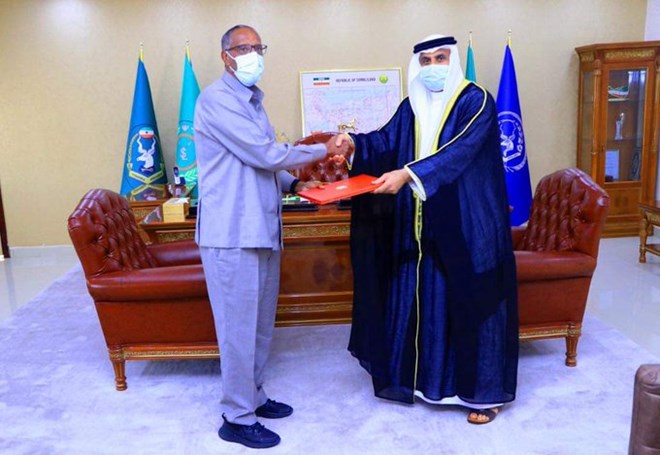
Abdullah Muhammad Al Naqbi presented his credentials as Director of the UAE Trade office in Somaliland to Muse Bihi Abdi, President of the Republic of Somaliland.
During the meeting, Al Naqbi conveyed to President Abdi the greetings of President His Highness Sheikh Khalifa bin Zayed Al Nahyan, His Highness Sheikh Mohammed bin Rashid Al Maktoum, Vice President, Prime Minister and Ruler of Dubai, and His Highness Sheikh Mohamed bin Zayed Al Nahyan, Crown Prince of Abu Dhabi and Deputy Supreme Commander of the UAE Armed Forces, wishing the people of Somaliland more progress and development.
For his part, the President of Somaliland reciprocated the greeting to the UAE leaders, wishing the government and people of the UAE continued prosperity.
He also wished Al Naqbi a successful tenure to further consolidate the bilateral relations across various fronts, stressing his country’s readiness to provide all that is needed to facilitate his mission.
Al Naqbi highlighted the UAE’s interest in strengthening relations between the two countries in various areas to further consolidate the brotherly relations between the two nations.
During the meeting, areas of cooperation between the UAE and the Republic of Somaliland were reviewed, and ways of developing them were discussed.
Stability at risk as Somalia and Kenya spat over sea border
Stability at risk as Somalia and Kenya spat over sea border




Source: DW, By Cristina Krippahl
Tuesday March 16, 2021
A dispute between Kenya and Somalia over an oil- and gas-rich area in the Indian Ocean is unlikely to spark an armed conflict. But it may have ramifications for fishing communities, as well as the wider region.

Fishermen go about their day on the Kenyan port of Lamu Island, which lies near the disputed area
The ongoing standoff between Kenya and Somalia over a sizable area of the Indian Ocean has sparked concern among hundreds of thousands of people who depend on the region’s rich fishing grounds for survival.
“We are really worried,” the Kenyan fisherman Adam Lali told DW. “If the border issues are not handled well, they will bring us problems. This will rob us of our fishing areas and will also cause tensions between us and Somali communities.” The disputed area stretches over 160,580 square kilometers (62,000 square miles). Somalia, which lies northeast of Kenya, wants to extend its maritime frontier with Kenya along the line of the land border, in a southeasterly direction. Kenya, however, wants the border to head out to sea in a straight easterly line, which would give it more maritime territory. As well as being an important fishing ground for both countries, the area is also rich in gas and oil.
Kenya backs out of court hearing
After Somalia first brought the case to the table in 2014, the UN’s International Court of Justice (ICJ) was scheduled to begin the public hearing in The Hague on Monday. The proceedings were expected to run until March 24.
Before proceedings could begin, Kenya’s government announced its intent to withdraw from the case and present its complaints to the UN Security Council, of which it is currently a nonpermanent member.
Based on international maritime law, the court was widely expected to rule in Somalia’s favor.
“Possibly the Kenyans withdrew also because of an expectation that they might just lose,” the political scientist Stig Jarle Hansen, from the Norwegian University of Life Sciences, told DW.
No chance for a dialogue
Some Kenyan observers such as Mustafa Ali, an expert on conflict resolution and national security at the HORN Institute for Strategic Studies, do not believe that the ICJ was the best place to settle the dispute in the first place.
“There are so many alternative mechanisms that could be much more effective and would deliver results,” Ali told DW. “One is the Africa Union border mechanism. The second is direct bilateral negotiations between Kenya and Somalia. Which, in my view, would be the best solution.”
Such dialogue is unlikely to take place anytime soon. Relations between Kenya and Somalia, which are no strangers to border disputes, have become increasingly fractured. Tensions spiked after Somalia’s government severed diplomatic ties with Kenya in December, after accusing Nairobi of meddling in its affairs.
Kenya’s meddling in the spotlight
Decades-old resentments have recently come to the fore, including Kenya’s support for the semiautonomous Somali state of Jubaland.
“There is a large conflict within Somalia between the opposition and President [Mohamed Abdullahi Mohamed] Farmajo,” Hansen said. “And one of the most crucial actors is the Juba state.”
Many international observers agree with the accusations from Somalia’s government. In January, at least nine people were killed in fighting in Jubaland. Somalia blamed the deaths on Kenyan troops and militias backed by Nairobi. Kenya currently has a contingent of almost 3,500 troops in the African Union Mission to Somalia (AMISOM), deployed to fight the terrorist group al Shabaab.
A fragile state weakened further
Kenya’s government has denied any wrongdoing, accusing Mogadishu of seeking a scapegoat for domestic problems.
Hansen said there could be some truth to that. “I think there is a greater will now to face off with Kenya to distract from the country’s internal strife,” he said.
Last year’s removal of Somali Prime Minister Hassan Ali Khaire, who was in the middle of successful negotiations with Kenya, fits this hypothesis, he added.
Tensions have also been rising within Somalia, as Farmajo continues ignore calls to step down and hold elections that were originally scheduled for 2020 and later rescheduled for February 2021.
A constitutional crisis is now unfolding in the fragile state. Last Friday, the UN Security Council urged Somalia’s government to organize elections “without delay” in a resolution that stressed the pressure al-Shabaab and armed opposition groups were placing on the country’s already-poor security.
A win for al-Shabab?
The militant group al-Shabab is capitalizing on the situation by focusing its propaganda on attacks against the president. There are also concerns that the resources meant to combat terrorist groups will be redirected toward resolving internal political frustrations.
“We’ve seen that already with the Somali special forces being deployed inside Mogadishu,” Hansen said. “And so there will be much less pressure on al-Shabab, which will give it the possibility of further expansion.”
Potential for regional disruption
Hansen said there was the potential for further political turmoil in the wider region, where many conflicts are deeply intertwined.
Ethiopia, where Prime Minister Abiy Ahmed is currently fighting a war in the Tigray region, supports Farmajo’s government and has offered to train his troops. .
Sudan and Egypt are joining forces to oppose Ethiopia’s building of a giant dam along the Nile. There’s also the possibility that Sudan could intervene in Tigray.
“So you have a strange conflict brewing from Cairo in the north to Kenya in the south, which can create a lot of trouble for the world in the near future,” Hansen said.
Andrew Wasike contributed to this article
ICJ hears maritime dispute despite Kenya boycot
ICJ hears maritime dispute despite Kenya boycott




Source: Hiiraan Online, Tuesday March 16, 2021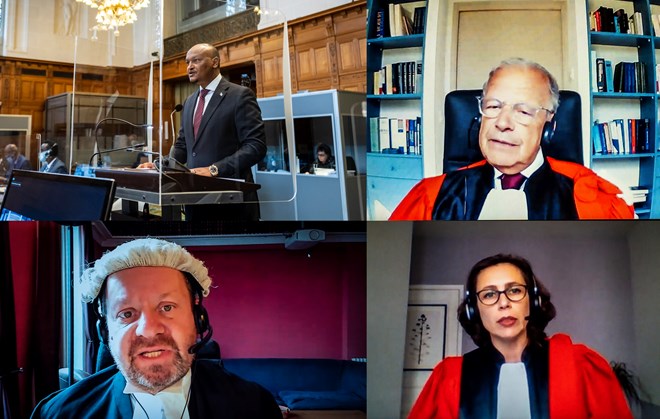
Members of the Delegation of the Somalia on the first day of the hearings / Thursday 18 March 2021 / Copyright: UN Photo/ICJ-CIJ/Frank van Beek. Courtesy of the ICJ.
Mogadishu (HOL) – The International Court of Justice began oral hearings in the maritime dispute between Somalia and Kenya, despite the latter refusing to participate in the legal proceedings brought against it.
The presiding judge in the case, Joan Donoghue, confirmed that Kenya has pulled out. Kenya was not present in court or via videolink.”Kenya informed the court by letter, dated March 11 received March 12, that they would not participate,” presiding Judge Joan Donoghue said. She added that “the court regrets the decision of Kenya not to participate in the oral proceedings.”
Despite Kenya’s boycott, the ICJ will still proceed with the hearing. Donoghue said that the court would rely on Kenya’s written submissions.
The court refused Kenya’s request to address the court for 30-minutes at the start of the hearings.
Kenya newspapers revealed the bombshell decision to not attend the weeklong hearings on Sunday citing the court’s bias and its refusal to grant Kenya a fourth postponement. Kenya’s Attorney General argued that their new legal team did not have adequate time to prepare in light of COVID-19.
Deputy PM: Kenya has no grounds to complain
Somalia’s Deputy Prime Minister Mahdi Mohamed found fault with Kenya’s reasoning for pulling out.
“We are deeply concerned that Kenya has decided not to appear at these hearings,” said Mahdi Mohammed Gulaid, opening Somalia’s case. He said it was “inconsistent with the rule of law” and Kenya’s commitment to the court.
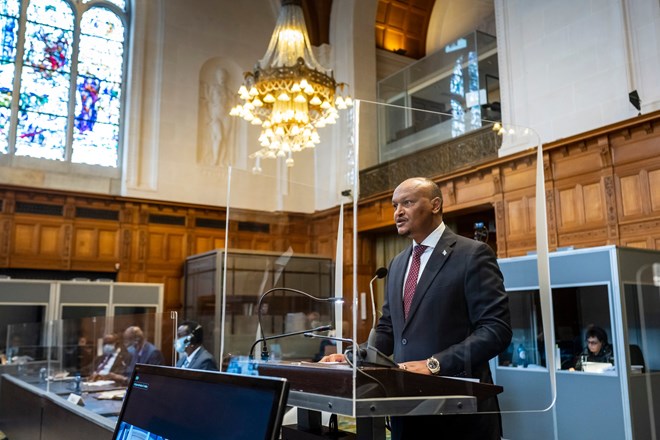
Somalia’s Deputy Prime Minister Mahdi Mohamed addressed the International Court of Justice on the first day of hearings in the Kenya-Maritime dispute. Copyright: UN Photo/ICJ-CIJ/Frank van Beek. Courtesy of the ICJ.
Kenya “has no grounds to complain about its treatment by the court” after the ICJ granted three previous requests for delays that held up the case by 18 months, he said.
Guled said that Somalia found itself at the Hague after a failed attempt at settling the maritime dispute amicably with Kenya.
“We hoped that it would be possible to settle our dispute with Kenya bilaterally, through negotiations. Unfortunately, that proved impossible.”
The international court will decide who has legal jurisdiction over a potentially lucrative, triangular stretch of 100,000 square kilometres of offshore territory believed rich in hydrocarbons and fish. The ruling cannot be appealed, but its enforcement relies on the UN Security Council, of which Kenya is a non-permanent member.
The conflict’s origins date back to early April 2009 when both countries agreed to have a UN commission determine the maritime border and decide to work on a diplomatic, out-of-court solution. Kenya registered with the MOU with the Secretariat of the United Nations on June 11, 2009.
On June 23, 2009, barely three months after entering the MOU with Somalia, Kenya reached a favourable agreement with Tanzania. The two countries decided their maritime border would lie line parallel to the line of latitude.
Somalia is arguing that the maritime boundary should follow the direction of the land border and run diagonally. Conversely, Kenya wants it to run parallel to the latitude, as it negotiated with Tanzania in their 2009 agreement.
A maritime border will determine which nation holds the exclusive right to energy resources beneath the sea.
In 2012, Somalia accused Kenya of awarding exploration rights to two European multinational oil and gas companies, Total and Eni.
The Somali government sued Kenya at the ICJ in August 2014 after no progress was made in meetings to settle the conflict.
The dispute has fuelled the deteriorated diplomatic relationship between the two East African neighbours. Mogadishu cut ties off with Nairobi in December 2020, accusing it of interfering in Somalia’s internal affairs. Kenya denied the charge.
Somalia will continue its oral presentation on Tuesday between 3 PM and 4:30 PM.
You can watch the full hearing below:
Maritime Delimitation in the Indian Ocean (Somalia v. Kenya) – Public hearings – Monday 15 March 2021 (3 p.m.-6 p.m.) – First round of oral argument of Somalia – PART 1https://players.brightcove.net/1362235914001/B1J3DDQJf_default/index.html?directedMigration=true&videoId=6240723288001&
Maritime Delimitation in the Indian Ocean (Somalia v. Kenya) – Public hearings – Monday 15 March 2021 (3 p.m.-6 p.m.) – First round of oral argument of Somalia – Part 2
https://players.brightcove.net/1362235914001/B1J3DDQJf_default/index.html?directedMigration=true&videoId=6240723432001&
advertisements
Somalia says ‘deeply concerned’ by Kenya’s withdrawal as maritime case resumes
Somalia says ‘deeply concerned’ by Kenya’s withdrawal as maritime case resumes




Source: Hiiraan Online, Tuesday March 16, 2021
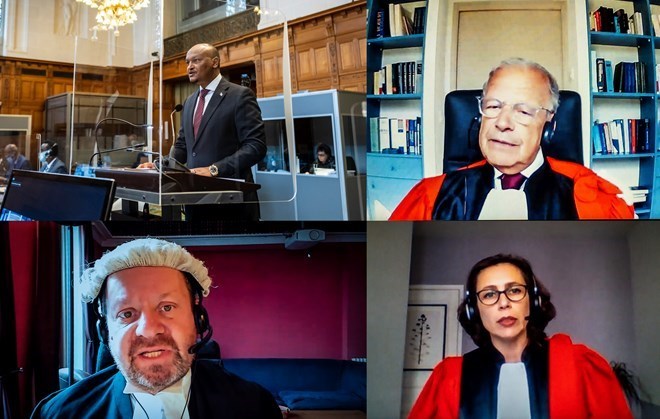
THE HAGUE (HOL) – Somalia has said it is ‘deeply concerned’ by Kenya’s decision to pull out of the maritime case but argued Nairobi had no grounds to take such a move since the International Court of Justice had aceeded to most of its demands,
In his opening remarks at the Hague Monday, Somalia’s principal agent Deputy Prime Minister Mahdi Guled said the Court had been fair to Kenya and should not have pulled out.
“We are deeply concerned that Kenya decided not to take part in this proceedings. Kenya has no ground to complain about its treatment by this court,” Guled said.
Guled also told the Court, Somalia had decided to pursue justice at the UN court after bilateral and diplomatic channels to resolve the case with Kenya failed.
Guled who led the Somali legal team also pocked holes at Kenya’s argument that its sea boundary should run on a parallel of latitude contrary to international practices of the law of the sea. The argument, Mahdi said ‘was made in Kenya’.
Mahdi added that Somalia had forfeited its claim for ‘compensation for the violation of our maritime rights’ but was focused on securing its territorial rights.
Earlier, the Court rejected Kenya’s request to address the Court. Attorney General Kihara Kariuki had sought the Court’s leave to address it to explain Kenya’s reason for withdrawing from the case.
Somalia’s first advocate Professor Alaine Pellet, a French lawyer was first to take the stand via vidoelink.
Two others lawyers, Paul Richler (US), Prof. Philippe Sands (UK) are representing Somalia.
The case continues tomorrow.
Delays in negotiations between EU and AfDB slows €42 road project in Somalia
Delays in negotiations between EU and AfDB slows €42 road project in Somalia




Source: Hiiraan Online, Tuesday March 16, 2021
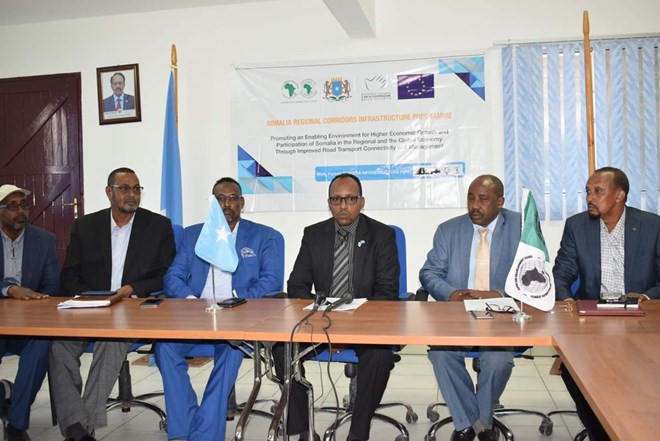
MOGADISHU (HOL) – Delays in negotiations between the European Union and the African Development Bank have hindered a EUR 42 million road construction project in Somalia approved in 2019.
The European Union Delegation in Somalia and the Ministry of Planning said in a joint statement talks with the African Development Bank which is supposed to implement the project had delayed construction works under the Somalia Regional Corridors Infrastructure Programme (SRCIP).“There have been delays to the process due to ongoing negotiations between the EU and the AfDB regarding the overall framework arrangement,” the statement read in part. It however noted the delays are not limited to Somalia but across Africa.
The EU and Somalia signed the SRCIP deal in June 2019. The contract involves the rehabilitation and construction Beled Weyne – Galkayo covering 327 km, Galkayo – Garowe (240km) and Galkayo – Hobyo which stretches for 241km.
The SRCIP also covers the Luuq, Ganane – Dolow which is a distance of 80km.
The second part of the project-Jalam-Harfo Road Rehabilitation Project billed at EUR 6 million and signed in December 2019 is ongoing under the implementation of the United Nations Office for Project Services (UNOPS). This is part of the Gaalkacyo – Garowe Road Project.
“UNOPS has begun the implementation process of this road, and the process is fully on course. So far, the feasibility study has been concluded and material testing has been conducted,” the joint statement added.
Ethiopia’s Economic Recovery Threatened
Ethiopia’s Economic Recovery Threatened
Source: CNBC posted on 12 March 2021 an article titled “Ethiopia’s ‘Simmering Civil War’ Threatens to Erode Economic Recovery Prospects” by Elliott Smith.
A combination of COVID-19 and civil war in Ethiopia have led the IMF to forecast zero percent GDP growth in real terms in 2021. Moody’s placed Ethiopia’s B2 credit rating–meaning it’s viewed as speculative and high-risk–on review for downgrade.0 commentsLabels: Abiy Ahmed, Antony Blinken, AU, civil war, COVID-19, credit rating, debt, ENDF, Eritrea, Ethiopia, EU, GDP, Germany, IMF, Tigray Region, TPLF

